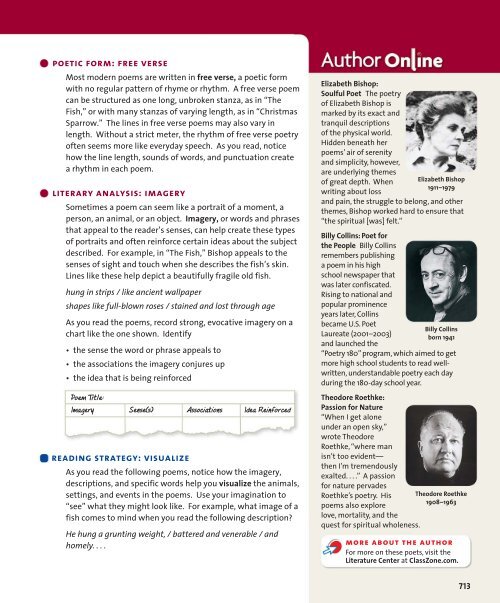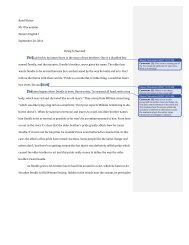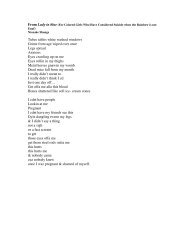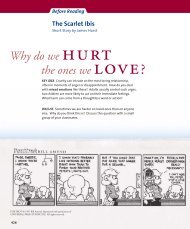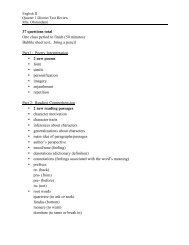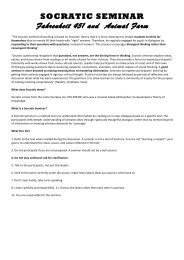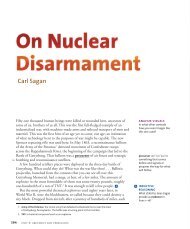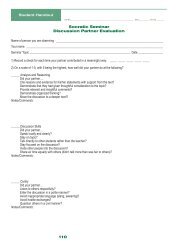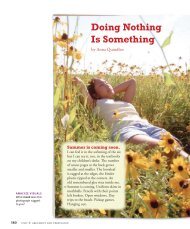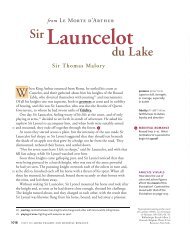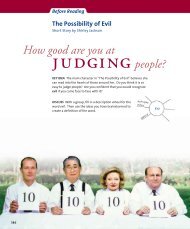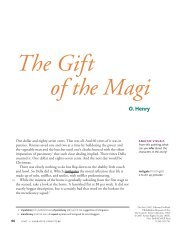The Language of Poetry - LanguageArts-NHS
The Language of Poetry - LanguageArts-NHS
The Language of Poetry - LanguageArts-NHS
You also want an ePaper? Increase the reach of your titles
YUMPU automatically turns print PDFs into web optimized ePapers that Google loves.
poetic form: free verse<br />
Most modern poems are written in free verse, a poetic form<br />
with no regular pattern <strong>of</strong> rhyme or rhythm. A free verse poem<br />
can be structured as one long, unbroken stanza, as in “<strong>The</strong><br />
Fish,” or with many stanzas <strong>of</strong> varying length, as in “Christmas<br />
Sparrow.” <strong>The</strong> lines in free verse poems may also vary in<br />
length. Without a strict meter, the rhythm <strong>of</strong> free verse poetry<br />
<strong>of</strong>ten seems more like everyday speech. As you read, notice<br />
how the line length, sounds <strong>of</strong> words, and punctuation create<br />
a rhythm in each poem.<br />
literary analysis: imagery<br />
Sometimes a poem can seem like a portrait <strong>of</strong> a moment, a<br />
person, an animal, or an object. Imagery, or words and phrases<br />
that appeal to the reader’s senses, can help create these types<br />
<strong>of</strong> portraits and <strong>of</strong>ten reinforce certain ideas about the subject<br />
described. For example, in “<strong>The</strong> Fish,” Bishop appeals to the<br />
senses <strong>of</strong> sight and touch when she describes the fish’s skin.<br />
Lines like these help depict a beautifully fragile old fish.<br />
hung in strips / like ancient wallpaper<br />
shapes like full-blown roses / stained and lost through age<br />
As you read the poems, record strong, evocative imagery on a<br />
chart like the one shown. Identify<br />
• the sense the word or phrase appeals to<br />
• the associations the imagery conjures up<br />
• the idea that is being reinforced<br />
Poem Title:<br />
Imagery Sense(s) Associations Idea Reinforced<br />
reading strategy: visualize<br />
As you read the following poems, notice how the imagery,<br />
descriptions, and specific words help you visualize the animals,<br />
settings, and events in the poems. Use your imagination to<br />
“see” what they might look like. For example, what image <strong>of</strong> a<br />
fish comes to mind when you read the following description?<br />
He hung a grunting weight, / battered and venerable / and<br />
homely. . . .<br />
Elizabeth Bishop:<br />
Soulful Poet <strong>The</strong> poetry<br />
<strong>of</strong> Elizabeth Bishop is<br />
marked by its exact and<br />
tranquil descriptions<br />
<strong>of</strong> the physical world.<br />
Hidden beneath her<br />
poems’ air <strong>of</strong> serenity<br />
and simplicity, however,<br />
are underlying themes<br />
<strong>of</strong> great depth. When<br />
writing about loss<br />
and pain, the struggle to belong, and other<br />
themes, Bishop worked hard to ensure that<br />
“the spiritual [was] felt.”<br />
Billy Collins: Poet for<br />
the People Billy Collins<br />
remembers publishing<br />
a poem in his high<br />
school newspaper that<br />
was later confiscated.<br />
Rising to national and<br />
popular prominence<br />
years later, Collins<br />
became U.S. Poet<br />
Laureate (2001–2003)<br />
and launched the<br />
Elizabeth Bishop<br />
1911–1979<br />
Billy Collins<br />
born 1941<br />
“<strong>Poetry</strong> 180” program, which aimed to get<br />
more high school students to read wellwritten,<br />
understandable poetry each day<br />
during the 180-day school year.<br />
<strong>The</strong>odore Roethke:<br />
Passion for Nature<br />
“When I get alone<br />
under an open sky,”<br />
wrote <strong>The</strong>odore<br />
Roethke, “where man<br />
isn’t too evident—<br />
then I’m tremendously<br />
exalted. . . .” A passion<br />
for nature pervades<br />
Roethke’s poetry. His <strong>The</strong>odore Roethke<br />
1908–1963<br />
poems also explore<br />
love, mortality, and the<br />
quest for spiritual wholeness.<br />
more about the author<br />
For more on these poets, visit the<br />
Literature Center at ClassZone.com.<br />
713


